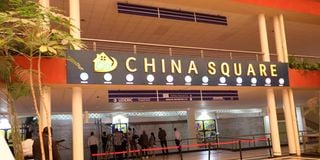Premium
Kenyan traders sue over influx of Chinese ‘Hustlers’ undercutting them

China Square in Nairobi, as pictured on February 27, 2023. The Chinese-owned supermarket has closed its doors indefinitely amid an uproar from competitors over low-priced goods.
Chinese-owned China Square mall is among more than 40 trading companies entangled in a lawsuit seeking to halt the operations of foreign entities selling low-priced imported goods on the Kenyan market.
The suit before the High Court has been filed by a group of Kenyan traders concerned over the Chinese allegedly selling everyday goods like curtains imported from China on average 50 percent cheaper than those brought in by their local counterparts.
The court action comes a month after China Square, which is based at Kenyatta University on the outskirts of Nairobi, was reopened following the dismissal of a counterfeit complaint against it.
The traders, under the auspices of a group called Indigenous Capital Protection Association, have sued the government protesting the influx of Chinese traders in Kenya.
The Chinese entities are being accused of undercutting local traders with ultra-low prices and driving them out of business.
The traders want the Immigration Services department to stop issuing Chinese nationals with employment and business permits.
Analysts said the move could strain relations with China, Kenya's biggest bilateral creditor.
Lawyer Kibe Mungai, who is representing the traders, reckons in the lawsuit that over two million jobs in Kenya are in danger in the wake of the influx of Chinese hawkers, including hawking goods in smaller towns.
Kenya has in the past struggled to find a middle ground between attracting foreign investment and promoting free trade while protecting local traders from what some see as unfair competition.
"In view of the increasing numbers of Chinese hawkers, shopkeepers, Route Eleven traders, small-scale retailers, wholesalers and distributors in Nairobi's River Road, Kirinyaga Road, Kamukunji and Gikomba areas among others, the petitioners are convinced that the process of issuing permits to Chinese citizens has been so corrupted or otherwise compromised by the Kenya Chinese Chambers of Commerce and other Chinese nationals operating businesses in Kenya," argues Mr Kibe.
He adds that the proliferation of hawking and micro-retail activities by Chinese nationals moving around on foot, setting up stalls, shops or trading from the boots of mini-vans is a threat to Kenyan traders.
"The proliferation is also a testament that the Kenya Investment Authority and the Kenya Citizens and Foreign Nationals Management Service are complicit in a grand scheme by the government of the Peoples Republic of China to foist upon Kenya the 'Chinese Hustlers' and economic migrants under the guise of investment and legitimate economic activities in Kenya," says Mr Kibe.
He wants the court to stop the Kenya Investment Authority from issuing investment certificates to Chinese nationals in order to stem the influx of foreigners.
The Kenya Investment Promotion Act, which sets conditions for foreign investors, requires an investment to be beneficial to the country through things such as new jobs, the transfer of new skills or technology, or the use of local raw materials or services.
There is no data available to show how many Chinese traders or people are in Kenya, but there has been growing anti-Chinese sentiment in recent years.
This has been partly fuelled by alleged racists incidents involving individual Chinese people in Kenya and perceptions of Chinese traders taking businesses and jobs from locals.
In 2019, the Kenyan authorities deported seven Chinese nationals who had been operating in two markets in Nairobi, accusing them of not having work permits and saying they could not operate in a sector that had been reserved for locals.
In 2020, four Chinese men were deported after being accused of caning a Kenyan man working at a Chinese restaurant.
President William Ruto has so far steered clear of the matter, but ahead of his election last year he promised to deport Chinese nationals engaging in business that can be done by Kenyans.
Traders in Kenya and other rapidly growing economies in Africa have occassionally protested over their Chinese competitors.
China is Africa's top trading partner and more than one million Chinese are estimated to reside on the continent.
Pending the hearing, the traders also want the court to issue an order compelling the Competition Authority of Kenya to conduct an investigation and file a report in court on whether China Square is engaging in predatory pricing to drive competitors out of business or to deter market entry for the benefit of manufacturers, distributors, wholesalers and retailers from China.
Trade Cabinet Secretary Moses Kuria last month raised concern that China Square was driving out Kenyan traders by selling imported cheap goods directly to consumers at low prices.
The store became attractive to consumers because of the low-priced goods.





